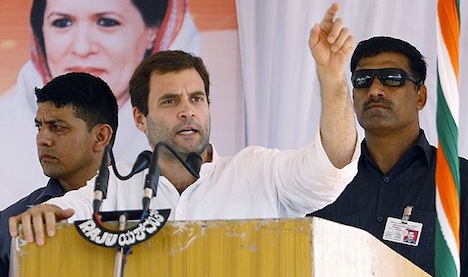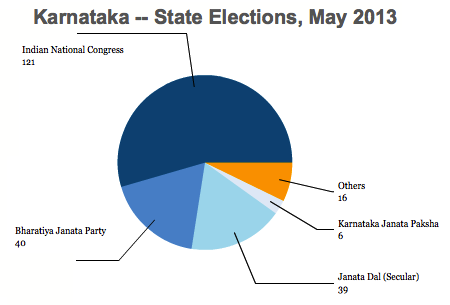Votes from Sunday’s elections in the Indian state of Karnataka were counted today and, as polls suggested, the troubled government of the conservative, Hindu nationalist Bharatiya Janata Party (the BJP, or भारतीय जनता पार्टी) has overwhelmingly lost.![]()
![]()
The Indian National Congress (Congress, or भारतीय राष्ट्रीय कांग्रेस) has won 121 seats — an absolute majority — among the 223 seats up for election in the Karnataka legislative assembly, the Vidhan Sabha (विधान सभा). In contrast, the BJP lost 72 seats and now holds just 40.
So what do the results mean for Indian national politics? As with most special elections and regional and local elections, it’s hard to extrapolate trends from a local election for national significance. But given that India’s national leaders, including very likely its next prime minister, all campaigned in Karnataka, there are some points worth noting, with India’s own national elections set to take place before May 2014.
First, critics of Gujarat chief minister Narendra Modi, both inside and outside the BJP, will have an argument that Modi’s brand of campaign magic isn’t transferable outside his own state. Modi campaigned vigorously in the final days of the campaign, and he’s widely seen as the frontrunner to lead the BJP in next year’s general election and even a slight frontrunner to become India’s next prime minister. But the BJP in Karnataka was always facing an uphill battle, so Modi’s failure to change the dynamic is no more or less indicative of his national appeal than Rahul Gandhi’s inability to help Congress win last year’s elections in India’s most populous state, Uttar Pradesh.
Second, the Karnataka election was the first state election since Rahul (pictured above) became the vice president of Congress, so a loss or a closer-than-expected race might have demonstrated that Congress’s brand — and the Gandhi brand — is wearing thin nationally. That didn’t happen, so from Rahul’s perspective, the election is a success.
Perhaps the most important lesson is the anti-incumbent mood, and it wouldn’t be surprising if many of Karnataka’s voters, who just ejected a BJP government this week, will be equally keen to eject the national Congress-led government next year — a government that’s been in office nearly a decade and has received much criticism, even abroad, for a drop in India’s economic growth and its relative lack of energy in pursuing economic reforms.
Back in Karnataka, however, attention will now turn to the next chief minister of a state that remains a technology-fueled economic star within India.
A third more leftist party, the Janata Dal (Secular) (JD(S), ಜನತಾ ದಳ(ಜಾತ್ಯಾತೀತ) will improve to 39 seats after Sunday’s elections, though it will not have won enough seats to give it a pivotal kingmaker role.
The BJP’s woes were intensified by the fact that its former leader and Karnataka’s scandal-plagued former chief minister from 2008 to 2011, B.S. Yeddyurappa, was running as a leader for yet another party, the Karnataka Janata Paksha (KJP), which won six seats, mostly by splitting the core support of the BJP. Yeddyurappa was the first of three BJP chief ministers since he led it to a victory in the previous 2008 election, and its government has been split by infighting over corruption and other matters, including a rising cost of living.
Although Congress will now certainly form the next government, it’s not clear who will replace outgoing BJP chief minister Jagadish Shettar — Congress didn’t announce a candidate for chief minister during the election, though there are a handful of potential choices:
- K. Siddaramaiah, the leader of the opposition in Karnataka’s legislative assembly, comes from the southern part of Karnataka that’s home to Mysore and Bangalore. He’s already expressed interest in becoming a candidate for chief minister, but he was a member of the Janata Dal (Secular) until 2007, and he even served as a former deputy chief minister under Janata Dal (Secular) prior to joining Congress.
- Mallikarjun Kharge, India’s current minister for labor and employment, is a Dalit leader who comes from the northern part of the state, has also expressed interest in becoming chief minister.
- M. Veerappa Moily, India’s current petroleum minister, is a potential dark-horse candidate.
- S.M. Krishna, a former chief minister of Karnataka from 1999 to 2004 and a former chief minister of the even more populous Maharashtra state from 2004 to 2008, he served from 2009 until late 2012 as India’s external affairs minister (India’s equivalent of foreign minister), though he hardly left on the best of terms with prime minister Manmohan Singh and he played only a subdued role in the Karnataka campaign.
The decision could well wind up in the hands of Rahul and his mother, Sonia Gandhi, who leads Congress nationally.


One thought on “As expected, BJP loses Karnataka state elections to surging Congress”